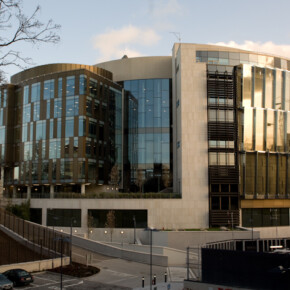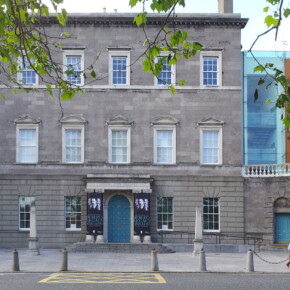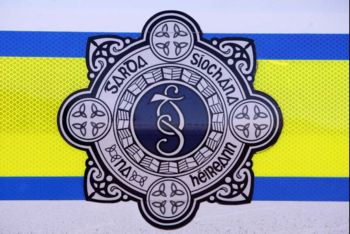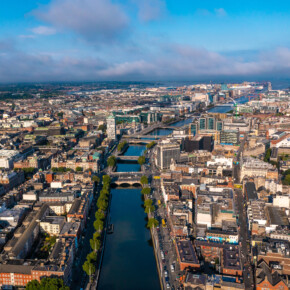A taxing affair on DCC as opposition splits over LPT issue
Mike Finnerty 30 Jul 2025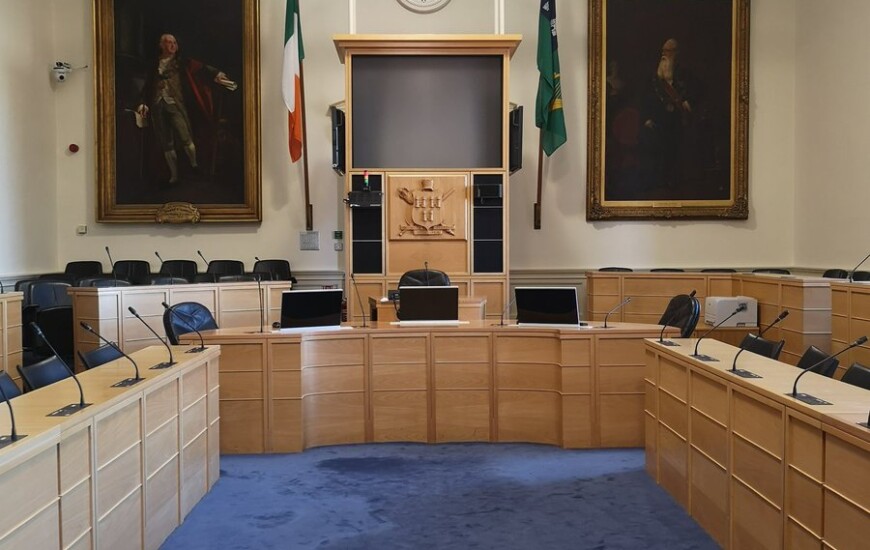
In the aftermath of the June 2024 local elections, an attempt was made to form a left-wing coalition on Dublin City Council.
Sinn Féin, the Social Democrats, Labour, the Greens, People Before Profit and select left-wing independents all took part in preliminary talks to run Dublin City Council until 2029, when the talks famously collapsed after Labour and the Greens disagreed with proposed cuts to the Local Property Tax.
In that scenario, Labour and the Greens teamed up with Fianna Fail and Fine Gael to run Dublin until 2029.
Over the last year, Sinn Féin, the Social Democrats, People Before Profit and left-wing independents have formed the “Progressive Alliance” and have consistently voted and sat with each other at council meetings.
A fresh bid was made in June to revive the alliance, with the attempts coming to nothing.
Speaking to Northside and Southside People in June, veteran Sinn Féin councillor Micheál Mac Donncha said that the LPT was a “foolish thing” for Labour to paint themselves into a corner with.
Now, it appears Sinn Féin’s prospective coalition partners may have damaged the partnership.
The July 18 meeting of Dublin City Council threw up a curveball; the Social Democrats split with Sinn Féin and voted along with Labour, the Greens, Fianna Fáil and Fine Gael to raise the LPT.
Speaking at the meeting, Social Democrats councillor and leader on Dublin City Council, Cat O’Driscoll, said, “we will be backing this motion, just as we have for the past five years – LPT is a progressive tax which is intended to support the development of key infrastructure and services.
The baseline rate translates to €16.4 million to Dublin City Council coffers for the lifetime of the council’s term. to improve its provision of services; the rate will be set at 7.5%, instead of the proposed 15% cut.
The extra millions paying for housing maintenance, road maintenance, footpath repairs, funding for discretionary spending, and paying for borrowing costs were cited by O’Driscoll as to why the Soc Dems opted to back the move.
“The Social Democrats will be backing this motion, just as we have for the past five years – LPT is a progressive tax which is intended to support the development of key infrastructure and services.
The Cabra-Glasnevin councillor noted that while it was true that the Soc Dems were voting alongside Fianna Fáil and Fine Gael, she said, by the same token, the government has dismissed “countless progressive measures which could have empowered local authorities to improve our city.”
She pointed to the government shooting down a tourist bed tax (favoured by the Soc Dems, Labour and the Greens) along with the government’s not providing a budget for the Dublin City Taskforce, an organisation set up by Fine Gael just after Simon Harris became Taoiseach last year.
“There’s an overwhelming need to invest in services to improve our streets and neighbourhoods across the city – increasing LPT to its base rate will assist in these efforts.”
For those paying attention, the Soc Dems’ move on this issue hasn’t come as a surprise; when the issue has come up on Fingal County Council, South Dublin County Council and Dún Laoghaire-Rathdown Council, the Soc Dems voted alongside Labour, the Greens, Fianna Fáil, Fine Gael and select independents.
Elsewhere on the soft left, Green councillor Michael Pidgeon criticised what he called “deep cowardice and dishonesty” within the Irish political system about the issue of taxation.
“We built an Irish state that has three sources of taxation: corporation tax, income tax, and VAT. Like any three-legged table, it’s wobbly. If you cut off one of those legs, you’re screwed.”
He said that in the event corporation tax revenue dries up, “it’s back to the crash,” and for that reason, it was important for Ireland to have additional sources of revenue.
“By relying on a narrow tax base, the Irish political system is baking in the next round of austerity; it won’t be a political choice, it will be an economic necessity.”
The South-West Inner City councillor said, “we need to get real, and we need to stop codding people with this stuff.”
At the South Dublin County Council meeting about the same issue, Labour councillor and former TD Joanna Tuffy remarked, “90% of the country’s wealth is held in property; this is a wealth tax. It would be unheard of for left-wing parties in other countries to argue against a property tax.”
Therein lies the rub; the parties such as the Social Democrats, Labour and the Greens believe in raising taxation to fund local government services, whereas parties such as Sinn Féin and People Before Profit (as well as left-wing independents) frame it as a battle over austerity and that the LPT is a hangover from the Trioka era, much like the Universal Social Charge (or the music of Mumford and Sons.)
Sinn Féin councillor and leader on Dublin City Council Daithí Doolan criticised what he called “an unholy alliance.”
Sinn Féin wanted to cut the LPT by a maximum of 15%, and said that the decision, which will keep it at the baseline rate of 7.5%, “will put an added burden on households already finding it hard to make ends meet.
“The unholy alliance have turned their backs on Dublin’s struggling families,” he said.
“This household charge is an unfair, regressive charge on people’s homes. It is not based on income or ability to pay. The prince pays the same as the pauper.”
The Ballyfermot-Drimnagh councillor said his party was “committed” to scrapping what he calls an “unfair tax.”
“It is unjust and is not based on income or ability to pay.”
“When households in Dublin are hit with the increased bills next year, the public will remember who voted for the increase.”
The difference of opinion between Sinn Féin and the Social Democrats on a major issue like taxation reveals the major differences between the parties and is something that can’t exactly be sorted over the course of a summer break.
The vote took place in the same week the Social Democrats turned 10, a party formed in protest at Labour’s propping up of austerity measures as part of a Fine Gael government.
It was a Fine Gael-Labour government which abolished town and urban councils in 2014, as an austerity measure (indeed, People Before Profit councillor Conor Reddy noted that the same two parties who weakened local government were now the same parties bemoaning the fact that local government has weakened powers).
The meeting heard that by raising the LPT, it would bring in €16.4 million in extra revenue that it otherwise wouldn’t have.
In June, councillor Mac Donncha noted that Dublin City Council has a budget of over €1 billion a year, and the taxation revenue generated by something like the LPT is a mere drop in the ocean.
Independent councillor Kevin Breen, who was co-opted into Barry Heneghan’s seat last year, said, “in case any of my fellow councillors have forgotten — we are in the middle of a severe cost of living crisis.”
“Food prices have skyrocketed, gas and electricity bills are through the roof, and the cost of childcare and sending children to school has risen dramatically. Families are being forced to make impossible choices just to get by.”
Right to Change councillor Pat Dunne said, “we see, very clearly, that the cost of living is causing great difficulty for many individuals and families. We’ve seen the cost of everything gone up over the last few years, so we’re asking, why are we adding another burden to that?”
He said the tax was flawed as it does not take into account the individual’s ability to pay.
“A social welfare recipient living in a 100-year-old house that might have been the family home for years still has to pay the same amount as property tax as their neighbour, who might be a high-income earner.”
From the government side, the 7.5% was seen as a more prudent measure.
Fianna Fáil councillor Daryl Barron said, “we are striving to improve public domains and make the city more accessible.”
“It is more important than ever that the executive gets that extra €16.4 million in revenue; it’s a gamechanger.”
“The city is a dirty old town, we keep saying it. It is high time we deliver. I’m sick of going through the streets of this city looking at bags. We need to do more and we need to strive for more,” the Donaghmede councillor said.
“We need to show the government that we are serious in this chamber; we need to show that we need business.”
Fine Gael councillor Danny Byrne said, “raising taxes is not popular, but it’s the prudent and fiscally responsible thing to do.”
The South-East Inner City councillor noted that part of the funding will be earmarked for tackling dereliction, an issue which he said is a “scourge” on the city.
He said that leaving the LPT at the base rate will enable the council to borrow for major projects such as the revitalisation of the Fruit Market.
“Some will say why doesn’t the government provide this money? Well, we can’t provide it ourselves, and we can’t rely on central government to provide it, so we have to do it ourselves.”
“We have to make a decision; is it another year of going begging or making the decision ourselves?”


